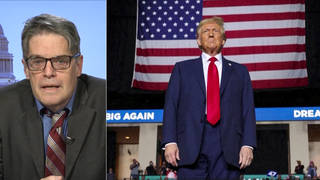
Related
Topics
Guests
- John Nicholspolitical writer for The Nation and co-author with Robert McChesney of the new book, People Get Ready: The Fight Against a Jobless Economy and a Citizenless Democracy.
Journalist John Nichols pays tribute to the investigative journalist, media critic, editor and educator Ben Bagdikian, who has died at the age of 96. Bagdikian wrote the 1983 book “The Media Monopoly,” about how the consolidation of media outlets by a small number of corporate owners threatened free expression and independent journalism. In 1971, as an editor at The Washington Post, Bagdikian received the Pentagon Papers from whistleblower Daniel Ellsberg and transferred them to Alaska Senator Mike Gravel, who entered them into the Congressional Record.
Transcript
AMY GOODMAN: This is Democracy Now!, democracynow.org, The War and Peace Report. I’m Amy Goodman. John Nichols is our guest, political writer for The Nation and author of a new book with Robert McChesney, People Get Ready: The Fight Against a Jobless Economy and a Citizenless Democracy.
I want to ask you about the investigative journalist, media critic, editor and educator Ben Bagdikian, who has died at the age of 96. He wrote the 1983 book The Media Monopoly, about how the consolidation of media outlets by a small number of corporate owners threatened free expression and independent journalism. In 1971, as an editor of The Washington Post, Bagdikian received the Pentagon Papers from whistleblower Dan Ellsberg and transferred them to Alaska Senator Mike Gravel, who entered them into the Congressional Record. His predictions of the monopolization of the media, to say the least, have borne out. You knew Ben Bagdikian.
JOHN NICHOLS: Surely did. He was our great inspiration. I mean—and, you know, he was an inspiration. If you were to ask Noam Chomsky and so many other folks who have really identified the challenges of media today, they all go back to Bagdikian, this incredible journalist, an Armenian-American immigrant who became the best in his field and then stepped out of his field, became a critic and a commentator, and essentially said, “Look, this monopolization is going to put so much power in a handful of corporate elites that we will begin to lose journalism.” Clearly, that has happened.
But the most important thing for people who are tuning in today or listening today is to understand that Ben Bagdikian predicted the 2016 election. He said that when you begin to really dumb down media and make it so huge that it becomes a dumb beast, that it literally lives off clicks and ratings, and it’s desperate to, you know, kind of draw in anybody, it’s going to—it’s not going to go for a higher level of discourse. It’s going to go to a point where it’s easily played by the likes of a Donald Trump. You read Bagdikian from 20 years ago, 30 years ago, you see the outlines for exactly where we are today.
And this is the most important thing: He said that especially dangerous was the killing out of local journalism. We have seen so much of that. And remember, in a democracy, democracy begins at home. When we don’t have good local journalism, people covering our communities, that’s when horrible things happen, things done in our name without our informed consent. Ben Bagdikian was literally the Paul Revere, riding through our villages and towns, telling us we can’t let this happen. Unfortunately, he didn’t succeed in every way. But if we read him and understand what he talked about, we begin to understand how we must respond to our current moment.
AMY GOODMAN: And what did he mean by the “media monopoly”?
JOHN NICHOLS: He started writing and said there were about 50 companies that controlled most of our media. He kept doing new editions of the book. The last edition of the book, which I believe was in 2004, it was down to five, five or six. And this is the simple reality. This is the guy who made us stop simply complaining about the media and start to understand the media system, the whole infrastructure of it. I think he did such incredible work on allowing us to understand corporate power over media. And the fact is, we now talk about media, generally, in ways—even Republicans talk about media power in ways that they don’t even know are rooted in Ben Bagdikian’s incredible research and writing.
AMY GOODMAN: Let’s end with a clip of Ben Bagdikian.
BEN BAGDIKIAN: It’s the fact that if you have competition, and if you think that you have to, that you will change the paper to fit the needs of your audience, that that really does work, because the audience in San Francisco—as a matter of fact, the audience in the United States as a whole—much more liberal than its newspapers, much more open to serious news about things they care about than most papers give them. But most papers can concentrate on the content that will attract ads and that will be minimally troublesome and will cost as little as possible. And if it takes live reporters to cover things in the city, then that’s expensive. Local stories cost almost twice as much as the stories that come out of the syndicated machines and newspapers will prefer. If they have competition, they will start covering things in a live way. And if they have competition, they will be forced to be closer to the needs and wants of the audience that they say they’re serving.
AMY GOODMAN: That’s Ben Bagdikian, who just died this week. John Nichols, thanks so much for joining us, political writer at The Nation. John’s latest book is People Get Ready: The Fight Against a Jobless Economy and a Citizenless Democracy. I’m Amy Goodman. Thanks for joining us.
RELATED VIDEO
Ben H. Bagdikian Reads Bay Area Dailies: The Strange World of San Francisco Print from Paper Tiger TV on Vimeo.













Media Options